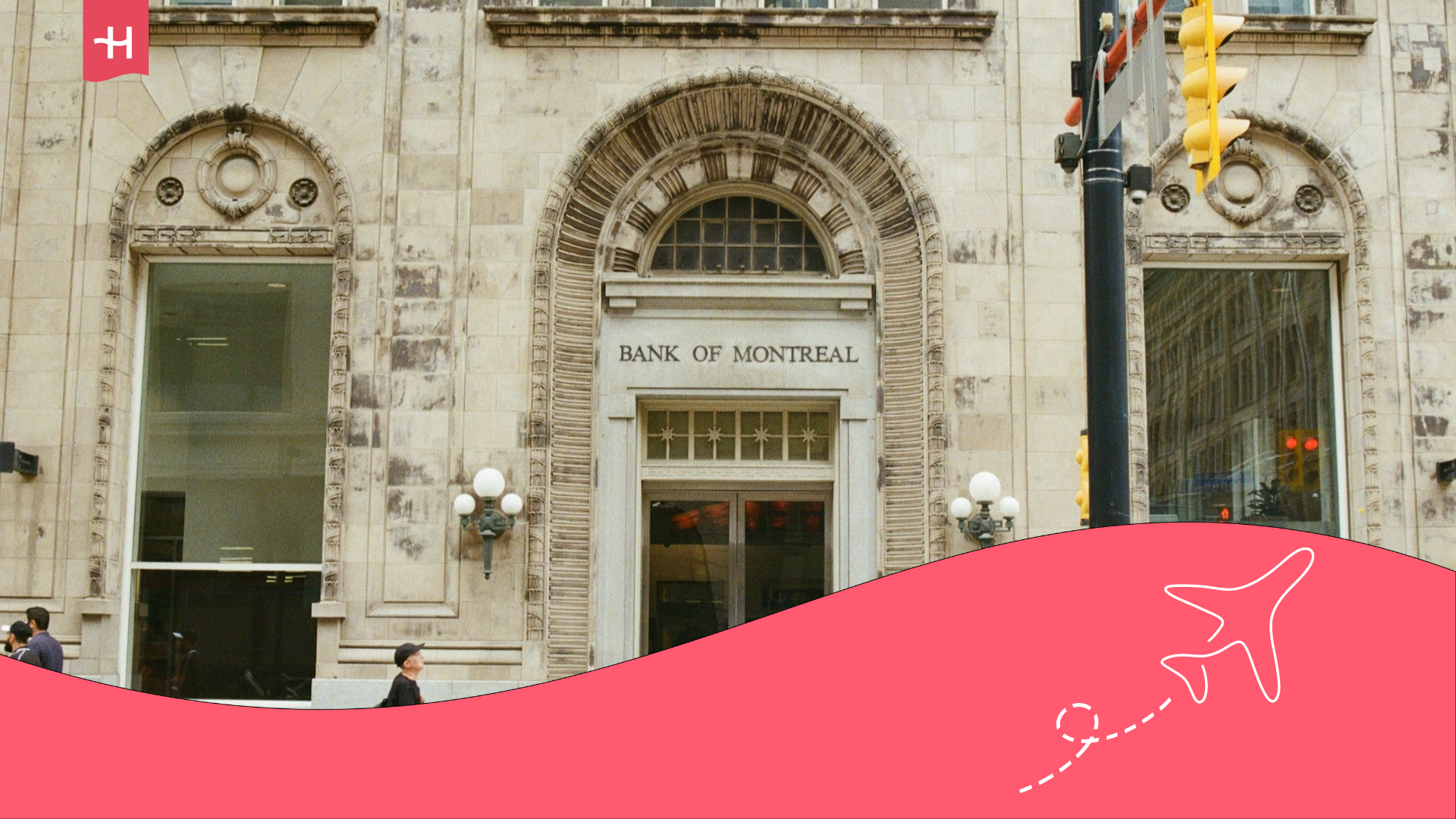Banks in Argentina for foreigners: Make your choice
Find out which are the best banks in Argentina for foreigners in this complete guide. We'll help you choose the best one!
If you’ve recently arrived in Argentina, whether for a permanent stay or a temporary one, you’re likely thinking about opening a bank account to manage your money. Argentina is known for its dynamic and sometimes unstable economy, and it offers a variety of banks with different services. Understanding which are the best banks in Argentina for foreigners will help you find the one that fits your needs best.
We’ve put together all the information you need to help you make an informed decision. Each bank has its unique features, strengths, and weaknesses. When choosing, consider factors that will ensure a great banking experience (along with meeting your financial needs), like technological innovation and customer service. Now, let’s explore the best banking options for foreigners in Argentina!
Why open a bank account in Argentina?
Living in Argentina can be a great experience. The country, with its passion for mate and football, offers a wide variety of landscapes (many of which look like something out of a movie), amazing food, vibrant culture, dynamic cities, and lovely rural towns. However, the country’s economic situation might feel a bit confusing at times, and you may not always know how to manage your finances. That’s why opening a bank account here can be really helpful, especially if you’re staying for a while. It’ll give you a clearer picture of things and access to helpful advice whenever you need it.
Here are a number of reasons that will guide you in your decision to open a bank account in Argentina:
- Ease of local transactions. Having a bank account will make everyday life much easier, from making purchases and paying bills to renting properties and receiving payments. It will also help you avoid high fees for currency conversions and give you access to faster, more affordable transfers.
- Access to local financial services. Personal loans, credit cards, savings plans, investments, and insurance are all available. On top of that, most banks in Argentina offer digital banking services, making it simple to manage your finances from anywhere. This is particularly helpful for digital nomads and remote workers who can travel across the country while still staying on top of their work responsibilities.
- Security in your savings. As we mentioned, the country has faced years of economic instability, which can make people hesitant about trusting the banking system. However, national banks are supported by the government through a deposit guarantee system, ensuring that your money is protected within certain limits.
- Facility to receive money from abroad. If you’re working remotely for a company abroad or receiving money from family, having a local bank account can make international transfers much simpler. You’ll be able to get paid in pesos and use the local currency without the hassle of frequent conversions. Just be sure to check on any taxes that might apply to these transfers, so you’re not caught off guard.
- Adjustment to the Argentine financial system. Having a bank account in Argentina will give you a better understanding of how electronic transfers, card payments, credit lines, and other common financial practices work, which can be useful whether you’re a resident or a frequent visitor.
- Possibility of having local cards. Having a debit and credit card is really important. You’ll quickly notice that locals prefer using credit cards since they allow you to make purchases and pay in installments, which helps manage your budget (as long as it’s done responsibly). Additionally, using local cards means you won’t have to depend on international ones, which often come with extra fees for foreign transactions.
- Incentives for temporary or foreign residents. Certain banks in Argentina offer special benefits for foreigners or temporary residents, like accounts with no maintenance fees for the first few months or banking services that don’t require a local credit history. This can make opening an account easier and more convenient.
- Compliance with legal regulation. Finally, if you’re planning to work or invest in Argentina, having a bank account is essential to meet certain legal and tax requirements.
Overall, having a bank account will simplify your life in Argentina. This is especially valuable, as relocating to a new country can be stressful with the need to adapt to different customs, lifestyles, and systems. It’s definitely a key step if you’re planning to stay for a while or engage in business there.

Requirements to open a bank account in Argentina
The process is relatively simple, but it’s not as easy as just showing up at the bank and asking for an account. You’ll need to meet specific requirements and provide certain documents. This applies to both residents and foreigners. Since the requirements can differ from one bank to another, it’s a good idea to contact the bank directly for the most accurate information.
Generally speaking, these are the documents that you’ll have to present in order to open a bank account:
- Valid identity document: You can present either your passport or national ID. In some cases, banks might also require an entry visa or another document to verify your stay in Argentina. If you’re from a MERCOSUR country, you can use your National Identity Document (DNI).
- Proof of address: Proof that you are living in the country. It can be a utility bill (water, electricity, gas, telephone, Internet) or a rental contract.
- CUIL or CDI number: The CUIL (Unique Labor Identification Code) or CDI (Foreigner Identification Code) is a number used to identify both residents and non-residents in the Argentine tax system. If you’re a foreigner and don’t have a CUIL, you can obtain one through AFIP (Federal Administration of Public Revenues). This number is essential for engaging in any formal financial activity in Argentina, such as opening a bank account.
- Income or source of funds: Sometimes, the bank may ask for a document to confirm where your income comes from. This could be a work certificate, a pay slip, or an employment contract. If you’re self-employed, you can submit a tax declaration related to your work or a letter from your employer.
- Initial deposit: Some banks may also require an initial minimum deposit to open the account. While this amount can vary depending on the type of account, it is usually quite low.
As you can see, opening an account isn’t that complicated. The Central Bank of Argentina also makes it easier for foreigners to open free savings accounts in pesos, with no fees for either opening or maintenance. All banks in the country must comply with this. That said, bigger banks are generally more accommodating to foreigners, while smaller banks or credit unions might have more stringent requirements.
Steps to open a bank account in Argentina
Opening a bank account in Argentina is a simple and quick process. The first step is to decide what kind of service you prefer before selecting a bank. If you want personalized service and advice, a local or international bank might be the right choice for you. However, if you’re looking to open an account from home, digital banks are a great option. Other factors to consider include account maintenance fees, the requirements to open an account, and the additional services each bank offers, as well as the type of account you’re looking to open.
Next, get your documents ready. Make sure to check that you have everything you need to avoid any delays. Once you have everything in order, you can either go to the bank in person or handle the process online if you’re using a digital bank. If you’re visiting a branch, you’ll need to fill out an account application with your personal information and sign the agreement outlining the terms of the service. For digital banks, just follow the instructions and upload scanned copies of your documents, like your passport, proof of address, and CUIL or CDI.
Lastly, you’ll need to make the initial deposit if it’s required. After that, you can activate your account, and within a few days, you’ll receive your debit card and, if requested, a credit card. Digital banks usually provide a debit card as well, which you’ll get by mail within one to two weeks after opening your account.
Remember, most banks in Argentina offer online or mobile banking. Once your account is active, make sure to set up access through the bank’s mobile app or website so you can manage your transactions and check your balance.

Types of banks in Argentina for foreigners
Now that you have a clearer picture of how to open a bank account, let’s go over the types of banks in Argentina for foreigners. Understanding what each one offers, along with their pros and cons, will help you choose the best fit, whether it’s a traditional bank or a digital one.
1. Digital Banks
In today’s digital age, online banks are gaining more and more popularity. In Argentina, they’re an excellent choice due to their easy-to-use platforms and lower operating costs. They’re also very convenient for foreigners traveling around the country, as they remove the hassle of having to find physical bank branches if any issues come up.
Some options of digital banks in Argentina include:
- Naranja X. It offers savings accounts and credit and debit cards with no monthly fees and no residency requirement. Its online banking platform is user-friendly and intuitive, making it easy for foreigners to manage their finances quickly and effortlessly.
- Ualá. This digital bank offers a free prepaid Mastercard and a completely free account. As a result, it’s another great option for foreigners looking for simple solutions without the need for a traditional bank account.
2. Traditional banks (private and public)
For those who prefer a more traditional banking experience, there are many local banks across the country. These are the most widespread in Argentina, with both public and private options available for residents and foreigners.
Private banks are institutions that offer a wide range of products and services, such as checking accounts, savings accounts, credit cards, loans, and investment services. Some of the most notable ones include:
- Banco Santander Río. Offers complete services, including accounts in pesos and dollars, credit and debit cards, and even exclusive products for foreigners.
- Banco Galicia. It’s one of the largest private banks in the country, with a wide network of branches and a range of banking products, including the option to open accounts in pesos or dollars.
- BBVA Argentina. Offers accounts for residents and non-residents, advanced digital services and financial products including savings accounts and credit cards.
- Banco Hipotecario. Despite its historical focus on mortgage credit, it also offers bank accounts and other products for foreigners.
Public banks are state-owned and also provide services to both residents and foreigners. They include:
- Banco Nación. Offers checking and savings accounts, with special conditions for workers, retirees and foreigners residing in Argentina.
- Banco Provincia. Provincial bank of Buenos Aires province, with an extensive network and banking products that are also available for foreigners.
3. International Banks
Argentina is home to several international banks that offer services to both local and foreign clients. These banks are often the go-to choice for those looking to make international transactions or needing banking services with strong ties to other countries. Some examples include:
- HSBC Argentina. This global bank provides checking and savings accounts, as well as investment products, for both residents and non-residents. Its international services are tailored to clients who need to conduct transactions across borders.
- Citibank. Although it has reduced its presence in Latin America in recent years, it still operates in Argentina, offering checking accounts and banking products designed for people working at multinational companies or engaged in international business.
4. Banks specialized in international or foreign clients
Lastly, there are banks that offer specialized services or products for foreigners or international clients. These banks generally cater to individuals seeking financial services related to investments, international trade, or those who need a bank with experience in dealing with non-resident customers. Some of the options available include:
- Banco de la Ciudad de Buenos Aires (BCBA). Even though this is a local bank, it offers products for foreigners and expats temporarily residing in the country.
- Banco Supervielle. Has some options for non-residents, especially regarding dollar accounts and international financial products.
Important: If you are a frequent traveler and want to stay connected without worrying about expensive roaming or looking for a new SIM at every destination, Holafly’s subscription plans are for you. With a single eSIM, enjoy internet in more than 170 countries for a fixed price and no surprises on your bill. travel without limits and connect easily and securely! 🚀🌍

What are the top 5 banks in Argentina for foreigners?
Now that you have a better understanding of the banking options for foreigners in Argentina, choosing the right one should be easier. If you’re still uncertain, we’ve put together our top five picks for the foreign community in the country. Our selection is based on factors like the range of products and services, account maintenance fees, transaction costs, and other elements that will impact your experience. Curious to see our top five?
1. Banco Santander Río
It’s one of the largest private banks in Argentina, offering a full range of financial services. It stands out for its excellent customer service and user-friendly digital banking platform.
You can open one of the following accounts at this bank:
- Santander Río Checking Account. Perfect for those who want to make daily transactions. This account has a monthly maintenance fee that varies according to the type of customer.
- Santander Río Savings Account. Ideal for saving in pesos or dollars and enjoying exclusive benefits.
- Salary account. Exclusively for those who work formally in Argentina.
Fees and costs are as follows:
- Monthly maintenance: Fees vary depending on the type of account, but generally, salary accounts have lower fees or are even free, while checking and savings accounts may have monthly charges.
- Wire transfers: Usually free of charge within Argentina, but some transactions outside the ATM network or by check may incur fees.
- ATM withdrawals: These are free of charge, but if withdrawals are made at ATMs of other banks, there may be an additional charge.
ATMs and branches: With more than 400 branches nationwide and a network of 8,000 ATMs, it also offers access to international networks like Cirrus and Plus, making it convenient to withdraw money while traveling abroad.
Other benefits: It offers online banking and a mobile app that provide customer support 24/7. These platforms make it easy and quick to make transfers, payments, inquiries, and more.
| Advantages | Disadvantages |
| Extensive network of branches and ATMs | Some commissions and fees can be high |
| Good customer service, with digital options | Higher requirements for certain products |
| Peso and dollar accounts available | Fees not always clear for some products |
2. BBVA Argentina
BBVA is another major private bank in the country. Its services are designed to make managing finances easier for both permanent residents and foreigners, making it a great option.
The accounts available for foreigners are:
- BBVA salary account. For those who receive a salary in Argentina.
- BBVA current account. For those looking to make daily transactions or payments, whether residents or foreigners who meet the requirements, there may be a monthly maintenance fee depending on the type of account and balance.
- BBVA savings account. To save with a fixed interest rate, either in Argentine pesos or in dollars.
- BBVA digital account. Perfect for those who prefer to handle all their transactions online or via mobile. This type of account is especially suited for foreigners who don’t need to visit physical branches, as it can be opened entirely online.
Fees and costs are as follows:
- Monthly maintenance: The salary account is generally exempt from maintenance fees, while checking and savings accounts may have a monthly fee.
- ATM withdrawal fees: Withdrawing money from BBVA ATMs is free of charge. However, if you use ATMs from other networks (like Link), a small fee may apply.
- Transfers and payments: Transfers within Argentina are usually free if made through online banking or the mobile app.
ATMs and branches: BBVA has more than 600 branches and about 6,000 ATMs throughout the country.
Other services: BBVA has an online banking platform that lets you easily and securely manage almost all your banking needs. Their mobile app, available for both Android and iOS, lets you transfer money, pay bills, check balances, apply for loans, and more.
| Advantages | Disadvantages |
| Good customer service and digital platforms | Some fees are not competitive compared to other banks |
| Large network of branches and ATMs | Not all accounts are available for non-residents |
| Offers products in dollars and pesos | Requires CUIL or CDI to open the account |
3. Ualá
Ualá is one of the most prominent fintech companies in Argentina, reshaping how people manage their money. Through this digital platform, users gain access to a prepaid Mastercard and fully online banking services. It’s not a traditional bank, but a financial tech company offering “digital banking,” meaning it operates entirely through its mobile app with no physical branches.
Accounts available for foreigners: Ualá relies mainly on its prepaid card and the services associated with it:
- Ualá Account. It’s fully digital and comes with a prepaid Mastercard, which can be used for online and in-store purchases, as well as for withdrawing cash from ATMs in the Link and Banelco networks.
- Ualá Digital Account. Although it’s not a traditional checking account, you can receive payments, make transfers, and manage your money easily and securely, all from your mobile.
Ualá applies the following fees and costs for its services:
- No opening or maintenance fees: This is one of the great advantages of this digital bank.
- ATM withdrawals: Cash withdrawals at Link and Banelco ATMs are free of charge.
- Card charges: No fees for deposits from your bank account.
- Service payments: Services such as electricity, water, cable, internet, etc., can be paid without additional commissions if made within the app.
ATMs and branches: Since Ualá is a fully digital bank, it doesn’t have physical branches. Withdrawals are made through ATMs in the Link and Banelco networks, which are the main ones in the country.
Other services: Ualá has a 24/7 customer service system within its app.
| Advantages | Disadvantages |
| Completely digital, no need to go to a branch office | No access to face-to-face services |
| No maintenance fees | Not suitable for those who prefer traditional services |
| International Mastercard | Withdrawal limits may be lower than those of a traditional bank |
4. Naranja X
Naranja X is another top digital banking option, popular among Argentinians and also a great choice for foreigners. Similar to Ualá, it’s a fintech platform that has grown in popularity for offering simple and accessible digital banking services. Originally launched as a credit card, it has expanded over the years to offer a full range of financial services, including bank accounts, payments, investments, and more.
Accounts available for foreigners:
- Naranja X Account. There are no opening or maintenance fees, and it includes a prepaid card that can be used for purchases in Argentina and internationally. The card also offers installment payment options, including a plan that lets you split payments into three interest-free installments, which is widely used by locals.
- Naranja X Credit Card. It offers various benefits, such as discounts at stores, special promotions, installment financing, and more. You’ll also have the option to request a Visa card.
- Paid Account. Naranja X also offers an account option that earns interest on the available balance, allowing you to grow your money without having to invest in more volatile and risky assets, like cryptocurrencies.
Fees and costs:
- Account maintenance: The digital account has no maintenance fees. It is also completely free of charge to open an account.
- Commissions for ATM withdrawals: Withdrawals at ATMs belonging to the Link and Banelco networks have no additional costs.
- Payment of services: You can pay for services such as electricity, water, gas, among others, without commissions.
Additional services: You will also be able to withdraw cash at commercial establishments affiliated to Naranja X, such as supermarkets and gas stations.
| Advantages | Disadvantages |
| No commissions or monthly fees | Although Naranja X offers a credit card, some users have reported that the credit lines are more limited compared to traditional banks. |
| Online opening, no complicated paperwork required | |
| International prepaid card |
5. HSBC Argentina
Our top five list of the best banks in Argentina for foreigners wouldn’t be complete without an international bank. Out of all the options in the country, HSBC stands out. As a branch of the global banking group with a presence in over 60 countries, it’s a reliable choice for foreigners looking to open a bank account in Argentina.
Accounts available for foreigners:
- HSBC Checking Account. For those who need to make daily payments, transfers, issue checks, among other services.
- HSBC Savings Account. It’s ideal for those who want a safe place to store their money and earn interest on their balance. This account is also available to foreigners, with an easy and completely digital registration process.
- HSBC Salary Account. It’s an appealing option for those who want to manage their savings in foreign currency, especially in US dollars. This is actually a strategy many Argentinians use to protect their money from inflation.
Fees and costs:
- Monthly maintenance fees: Although some accounts are exempt if certain requirements are met (e.g., maintaining a minimum balance).
- ATM withdrawals: Free in the HSBC network, with fees for ATMs outside the network.
- Interbank transfers: Free of charge through its online platform (within Argentina).
- Debit and credit cards: HSBC offers Mastercard debit cards linked to the accounts. Credit cards may have fees depending on the type of product.
ATMs and branches: You’ll find more than 100 HSBC bank branches in Argentina, as well as a network of 2,000 ATMs.
Additional services: HSBC has an online platform where you can check your balance, make transfers, pay bills, and more. Live chat customer service is also available for quick inquiries.
| Advantages | Disadvantages |
| International banking services | CUIL required to open accounts |
| Good access to international ATMs | Some commissions are higher than those of local banks |
| Wide range of products and services | Requires more paperwork to open the account |
Banks in Argentina for foreigners: which one is the best?
After considering various banking options in Argentina for foreigners, we’ve picked one that we think is the top choice. However, this really depends on each individual’s needs. For instance, a digital nomad earning in dollars has different requirements compared to a retiree who only needs basic services. So, this recommendation is completely subjective.
HSBC takes the top spot as the best bank for foreigners in Argentina. It’s a great option for anyone looking for an international bank with a wide range of services and a large ATM network. Although it charges some fees, the benefits and the ability to manage transactions in multiple currencies easily outweigh that.
One of the key benefits of HSBC is that it offers accounts in dollars, which is particularly important in Argentina, where inflation and the devaluation of the peso make many people prefer to save in a more stable currency. Additionally, their customer service is highly efficient, available through phone, live chat, email, and in-branch support, making it easy to resolve issues even if you’re not fluent in Spanish.

Frequently asked questions about banks in Argentina for foreigners
Yes, opening a bank account in Argentina is safe, especially if you go with reputable banks that are regulated by the Central Bank. Both traditional and digital banks follow strict guidelines to safeguard your funds. Just make sure to pick a bank that provides strong fraud protection and secure digital services.
Yes, you can receive international transfers in Argentina, but banks like HSBC and Santander are particularly well-equipped for this, thanks to their global reach. Traditional banks may charge fees for international transfers and often rely on partner banks to handle the transactions.
It really depends on what you’re looking for. If you want a dollar savings account, banks like HSBC offer that option. However, if you’re just after an account for transactions in Argentine pesos, digital banks like Ualá or Naranja X are very convenient. They provide fee-free checking accounts, and you can manage everything directly from your phone.
The fees can differ depending on the bank and the account type you go for. Banks like HSBC and Santander might charge monthly fees if your balance falls below a certain amount. However, digital banks like Ualá and Naranja X typically don’t have maintenance fees. Though you could face charges for international transfers or ATM withdrawals outside their network.





 Language
Language 


















 No results found
No results found







